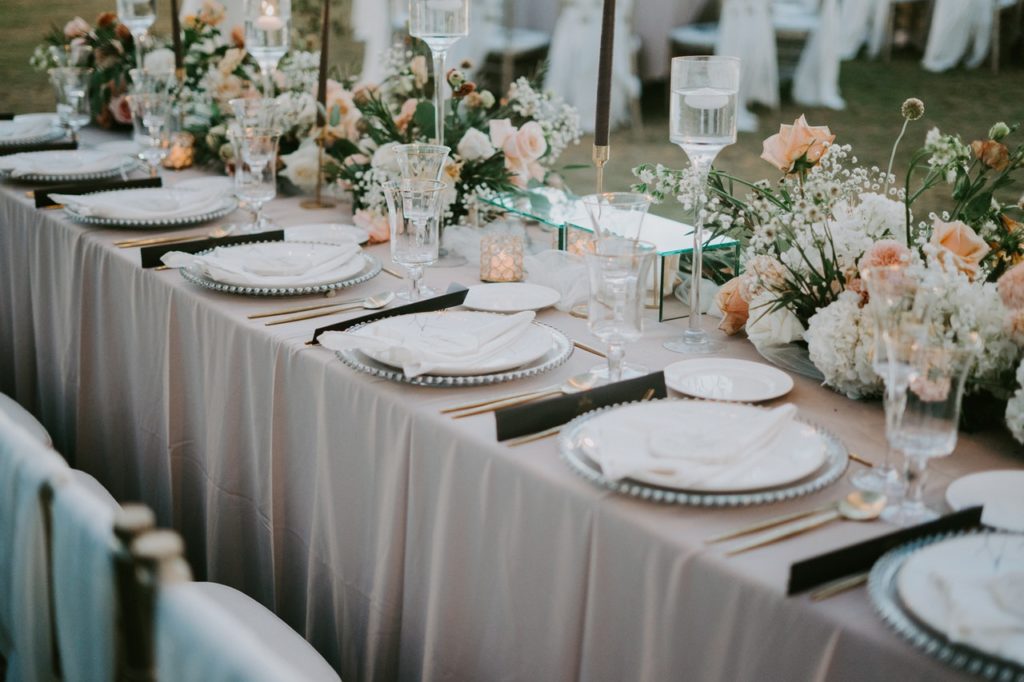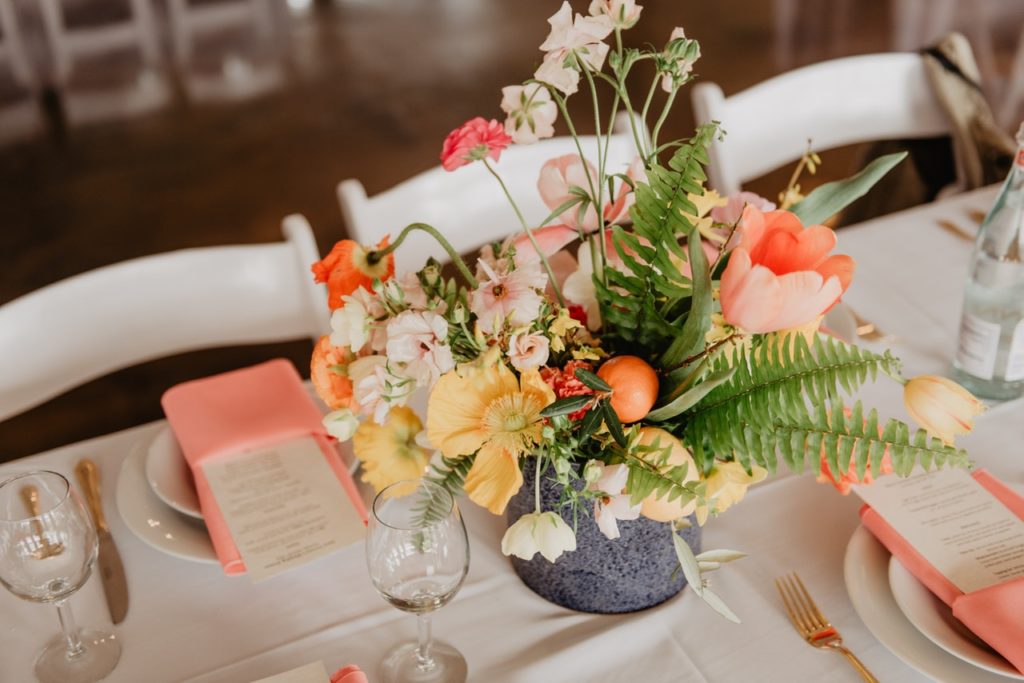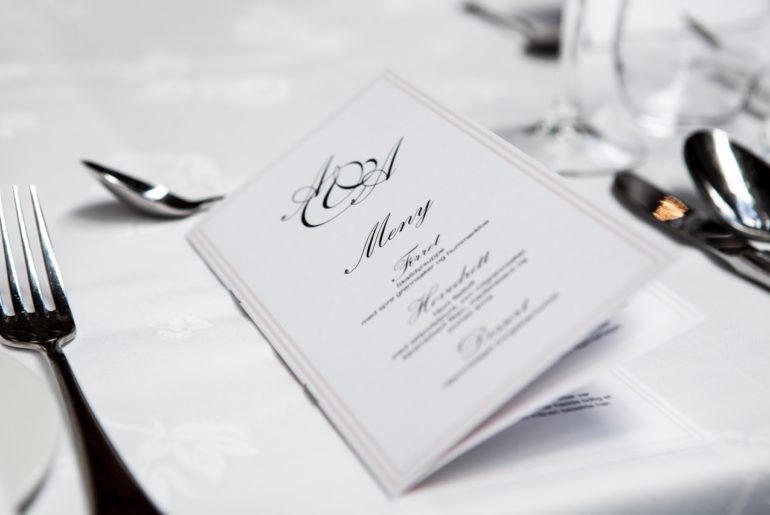Deciding on the food you’ll serve on your big day is one of the most exciting parts of planning a wedding, with a wide array of caterers to visit and taste tests to look forward to. However, while the occasion is all about you and your other half, your guests are still a vital part of the equation. And in an age where there seems to be more dietary considerations than ever to take into account, you can’t simply assume that everybody’s requirements will overlap.
With nutritional requirements, allergies and religious backgrounds to take into account, the fun of choosing your cuisine may turn out to be a lot more complicated than you expected. But when you consider that each person has taken time out of their life to celebrate your nuptials, so the least you can do is give them a delicious dinner for their troubles.
Rule number one is to contact all your guests and ask them to share any details you need to know, perhaps alongside their RSVPs. Once you’re aware of what everyone can and can’t eat, you and your partner can start designing a wedding menu suitable for all.

Dietary preferences
Modern nutrition is increasingly influenced by individual health concerns, as well as ethical issues, which means some of your wedding guests may have specific dietary preferences. The most common examples are gluten or lactose-free, vegetarian, vegan or pescetarian diets. Once you know all the requirements, you can look for a flexible caterer who can deliver mouth-watering dishes to all of your guests.
One option is to simply broaden your wedding menu by adding one dish to suit each eating plan. However, if you don’t want to limit your guests to a single choice, you may prefer to set up DIY food stations, which are set to be one of the biggest wedding trends of 2020. This means serving small plates to cover a diverse range of options, giving your friends and family the opportunity to choose from a variety of foods and make up a plate they’re excited to eat. Another benefit of ditching the sit-down dinner is that everyone has an excuse to get up, walk around and mingle with other guests, creating a less formal and more fun atmosphere.
Allergies
Some of the most common food allergies include nuts, dairy, wheat and shellfish, and need to be taken into account. These sensitivities can have huge health implications in the most serious cases, and the last thing you or your guests want is for someone to experience a severe reaction during your wedding.
Your first priority should be ensuring that nobody accidentally eats something they shouldn’t, so your caterer will need to outline every single ingredient in each dish that is being served. The best way to keep everyone safe is to pass this information on to those with allergies so they can identify what they can and can’t eat. If there are certain options they have to steer clear of, perhaps your caterer will be able to whip up an alternative. This could be by doing something as simple as changing a salad dressing, or using soy milk instead of cow’s milk, but make sure your guests review these updates as well, just in case any ingredient has gone unnoticed.
And if you are opting for a buffet-style system, ensure that those with allergies are allowed to serve themselves first in order to prevent potentially dangerous cross-contamination through serving utensils.

Religious requirements
The majority of religions have strict guidelines about what followers should and shouldn’t eat. Some of the most common practices are listed below:
Islam
- Muslims only eat halal meat, which means that the animal must have been slaughtered in a particular way, to be considered permissible in the eyes of Islam.
- This also applied to foods containing animal by-products. For example, if a cheese is made using rennet—an enzyme that comes from the stomach of young calves—Muslims can only eat it if the calf was slaughtered according to Islamic requirements.
- Islam prohibits the consumption of pork and crustaceans, as well as alcohol or any foods which contain it.
Judaism
- Jewish people only eat kosher food, which meets the standards of Jewish law.
- Under these guidelines, meat cannot be consumed with milk, cheese, butter or yogurt as part of the same meal.
- Meat from pigs and rabbits can’t be eaten, and beef can only be consumed if it’s cut from the cow’s forequarters. Permissible animals must be slaughtered by a certified person called a shochet, and soaked to remove traces of blood.
- Dairy products must come from a kosher animal and can’t contain meat-based derivatives like rennet or gelatin (which is derived from animal collagen).
- Kosher fish must have scales and fins, which prohibits the consumption of seafood like lobster, crab and shrimp.
- Eggs can only come from kosher fish or fowl, and have any traces of blood removed.
- Plant-based foods are kosher in their purest forms, but could become non-kosher if they’re processed. This may be due to the equipment and ingredients used.
Hinduism
- Most Hindus are lacto-vegetarian, so don’t eat meat and eggs.
- Though chicken, fish or lamb is sometimes consumed, Hindus will generally not eat beef, as a cow is considered a holy animal. Pork may also be avoided as some Hindus believe that pigs are dirty.
Sikhism
- Sikhs are allowed to decide whether they want to eat meat.
- Non-vegetarians can’t eat meat from animals slaughtered according to religious guidelines. This means Sikhs do not eat halal or kosher meat.
- Sikhs do not consume alcohol.
As you can see, it can be very tricky catering to different religions simultaneously. You could, for example, serve exclusively halal or kosher meat depending on the religious make-up of your guest list. However, this is something you would have to check with everybody, as many people outside of these faiths have moral objections to these means of slaughter.
If you need to prepare a meal for people from a number of different faiths, the simplest solution is to offer several tasty vegan options that everyone can eat. It’s also wise to leave alcohol out of the food altogether. Finally, make sure your caterer is careful with their utensils. If they prepare a dish with a knife used to cut regular meat, it may no longer be permissible in the eyes of certain religions.
Additional tips
- Label everything: This is particularly important for buffets and food stations. Every single dish should be marked accurately, so nobody gets any nasty surprises.
- Don’t forget desserts: Your wedding cake might not be suitable for all your guests. Serve a few alternative desserts to make sure that everybody can enjoy a sweet treat.
- Think of your own diet: If you and your partner follow a specific dietary plan or have any allergies, don’t sacrifice your own wedding dinner for the rest of your guests. For example, if you are both vegan, but don’t want to make all your family and friends go plant-based, ask your caterer to prepare a special meal for just the two of you.










Comments are closed.